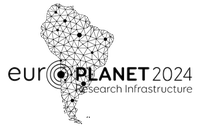Instructors
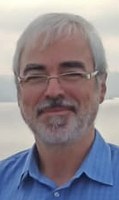
Rogelio ACEVEDO
Professor, Centro Austral de Investigaciones Científicas, Ushuaia, Argentina
PhD Geology Universidad de Buenos Aires and Geomologist (Universitat de Barcelona, 1993). He is a professor of Economic Geology and Geotechnics (Universidad Nacional de Tierra del Fuego) and has been a postgraduate visitor in numerous universities including Universidad de Oviedo (UO), Granada (UG), Zaragoza (UZ) and the Universitat Autònoma of Barcelona. He is also a staff researcher at the CADIC (Centro Austral de Investigaciones Científicas, CONICET). He published numerous books (7, 5 of them in Springer) and scientific papers in topics including geological resources, geoethics in Latin America, planetary geology, meteorites and impact craters in South America.
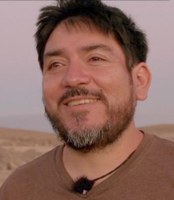
Armando AZUA-BUSTOS
Scientist, Center of Astrobiology CSIC-INTA, Spain
Environmental Microbiologist (PhD Molecular Genetics and Microbiology, 2013; M.Sc. Biological Sciences, 2010; M.Sc. Biochemistry, 2005; and B.Sc Agronomy, 1997), have >20 years of professional experience (Chile, US and Spain). Started my own fully independent research line with his PhD (2010-2013), uncovering the molecular mechanisms of extreme desiccation tolerance of microbial life of the Atacama Desert (video explaining PhD Thesis here). For this, he got a full PhD scholarship, and a separate full Research Fund from the Government of Chile. Later served 3 management (non-research) posts; Director of the Department of Astrobiology of the Chilean Aerospace Research and Development center, Coordinator of the Higher Education Quality Improvement Program of the Government of Chile at the Universidad Autónoma de Chile, and Scientific Advisor of the Senate of the Republic of Chile.
In 2017 came back to research again as a Scientific Researcher at the Centro de Astrobiología of CSIC. In 2018 won one of the prestigious Human Frontiers Science Program Grants, and also a grant from the Dubai Future Foundation. In 2017 won one of the prestigious TED Fellowships (having given 4 TED talks up to date) (Vancouver talk here).
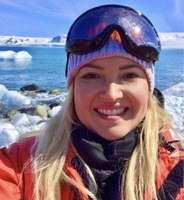
Amanda G. BENDIA
Professor, University of Sao Paulo, Brazil
PhD in Microbiology from the University of São Paulo. Professor at the Oceanographic Institute of USP, where she works in the area of ecology and microbial evolution in extreme marine environments, with a focus on the deep ocean and Antarctica. She also studies extremophile bacteria and archaea in the context of astrobiology. She was a member of the Board of APECS-Brasil (National Committee of the Association of Early-Career Polar Researchers), as Coordinator of Education and Scientific Dissemination between 2018 and 2022. She is a member of the Brazilian Society of Astrobiology, of "Deep-sea Biology Society" and the "DOSI (Deep Ocean Stewardship Initiative) Decade working group". She participated in four scientific expeditions to Antarctica by the Brazilian Antarctic Program, both to the Brazilian Antarctic Station Comandante Ferraz and aboard the Polar Ship Almirante Maximiano. She participated in the oceanographic expedition BIOIL (Shell / IO-USP) aboard the Noc Alpha Crucis and ProBioDeep (Shell / UFRJ) aboard the Fugro Aquarius.
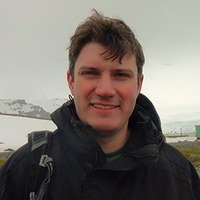
Douglas GALANTE
Researcher, National Synchrotron Light Laboratory, Brazil
PhD in Astronomy from the Institute of Astronomy, Geophysics and Atmospheric Sciences (IAG-USP) in 2009 and postdoctoral degree from the same institute (2012). He is currently a researcher at the National Synchrotron Light Laboratory (LNLS / CNPEM), leading the Carnaúba group, of the new Sirius nanofocus line. He works in the area of Astrobiology and Planetary Sciences. He is also an associate researcher at the Nucleus for Research in Astrobiology, NAP-Astrobio (IAG/USP) and has experience in studying the effects of radiation on chemical and biological systems, from micro to macro scale. He uses theoretical, experimental and fieldwork tools for the study of the interaction of life with its environment, in order to extrapolate to other planets the information of current life in extreme regions of the Earth, and past life, from the fossil record. Using 4th generation synchrotron techniques, he is contributing to the development of the new and growing field of nanopaleontology and geomicrobiology. He also works with the phenomenon of the origin of life, its adaptation to planetary surfaces and the habitability of the Solar System, including using space platforms.
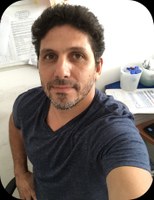
Fernando J. GOMEZ
Professor, Universidad Nacional de Córdoba, Argentina
Dr. Fernando J. Gomez (PhD Geology, CICTERRA-CONICET-UNC) is a professor at the Universidad Nacional de Córdoba and has been a visiting professor of Sedimentology, Stratigraphy and Biogeochemistry in Washington University, Saint Louis (Missouri, USA). His research focuses on sedimentology, biogeochemistry and geomicrobiology of modern and ancient sedimentary systems (lakes, marine systems and hot springs) (https://fernandojgomez.github.io/FernandoJGomez/). The focus is on planetary analogues and astrobiology (e.g. Mars) and for this reason he has been part of the Europlanet 2024 Research Infrastructure for Planetary Field Analogues.
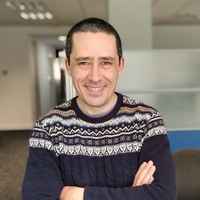
Dr. Juan Cruz GONZALEZ ALLONCA
Centro Interdisciplinario de Estudios Espaciales-CIEE, ARGENTINA
Juan Cruz González Allonca is a lawyer from the University of Buenos Aires (UBA) specialized in space law and holds a Master's degree in Systems Engineering from the Universidad Tecnológica Nacional (UTN). He is currently a member of the board of directors of the National Commission on Space Activities (CONAE) and director of the Interdisciplinary Center for Space Studies (CIEE). He also teaches Space Law and Policy in the Aerospace Engineering career at the Universidad Nacional de La Plata (UNLP). Juan Cruz is a TEDx speaker and contributor to various publications with articles related to space law and policy.
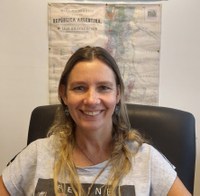
Karina L. LECOMTE
Professor, Universidad Nacional de Córdoba, Argentina
She obtain a PhD in geology, she is a staff researcher in the CICTERRA and a professor at the Universidad Nacional de Córdoba. Her research focuses on understanding the environmental geochemical dynamics of extreme environments, such as acid drainage systems, trying to unravel the geochemical processes that take place in the critical zone, the interface between minerals, fluids and biology at the Earth's surface.
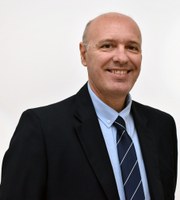
Giovanni LEONE
Assistant Professor, Universidad de Atacama, Chile
My main interest is the volcanology of Mars but I'm also interested in the volcanism and the geology of the other bodies of the Solar System, including the volcanological characterization of the exoplanets. My main achievement so far has been the origin of the Martian dichotomy and its links to the volcanoes of Mars. I named the following volcanoes on Mars, names then approved by the Working Group for Planetary System Nomenclature: Aonia Mons, Aonia Tholus, Electris Mons, Eridania Mons, Sirenum Mons, Sirenum Tholus. I'm currently involved in the application of muography to the study of the volcanoes and the environment of the Earth. Another field of research under development is the study of planetary simulants with future applications to biomining and space mining.
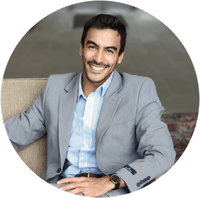
Juan Manuel LOSARCOS
SpaceBee Tech, Argentina
Juan Manuel Losarcos (SpaceBee Tech)
B.S. in Geology, 2021, Universidad Nacional de La Pampa, La Pampa, Argentina. He is a geologist and hydrogeologist, and currently a Ph.D. candidate in Planetary Geophysics, University of Illinois, Chicago, United States (Advisor: Dr. Andrew J, Dombard). He is also a research and development scientist in SpaceBee Technologies (https://www.spacebeetech.com/). SpaceBee Tech is a start-up company working on making planetary geology accessible for people as well as on the development of low-cost lunar rovers.
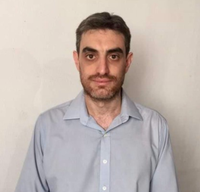
Santiago LUNA
Scientist, Universidad Nacional de Rosario, Argentina
Dr. Santiago Luna has a PhD in physics from the Universidad Nacional de Rosario. He is a postdoctoral fellow at LGP. His research area is AstroGeophysics, he is currently investigating the interrelation between thermal evolution and dynamical evolution of planetary systems. He also teaches Physics at UNAHUR.
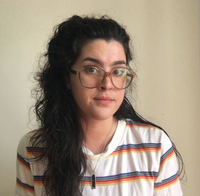
Mara MANTEGAZZA
Scientists, CONICET, Argentina
Mara Mantegazza is a geologist graduated from UBA and is currently a doctoral fellow at CONICET. She is part of LGP and her research is focused on the study of structures associated with subsurface ice in the middle and low latitudes of Mars and their impact on the history of the Martian cryosphere.
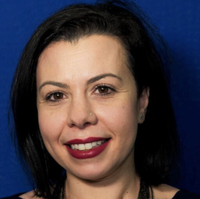
Alessandra MARINO
My interest is in critical Development Studies and issues of justice, equality and ethics. I look at how postcolonial and decolonial studies can contribute to current debates on knowledge production within space science and to decolonising astrobiology research methods. My research also explores how space technologies are used in International Development programmes funded by different Space Agencies to understand how effective they are at changing people's lives. This strand of research utilises and adapts the theory of 'Inclusive Innovation'.
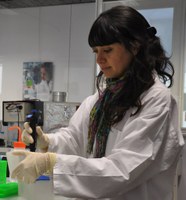
Cecilia MLEWSKI
Scientist, Universidad Nacional de Córdoba, Argentina
She is a biology researcher from the Universidad Nacional de Córdoba, Argentina, and CONICET. Her research is focused on the study of the microbial communities from microbial mats in extreme environments such as the Argentinean Puna and Antarctica. Using different high-throughput sequencing and microscopy techniques she analyze the microbe-mineral interactions in the microbial mats and associated microbialites with the potential to find proxies of the microbial influence in mineral precipitation.
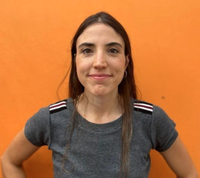
María Carolina ROJAS
Scientists, CONICET, Argentina
Lic. María Carolina Rojas is a geologist graduated from UBA and is currently a doctoral fellow of CONICET. She is part of LGP. Her doctoral work is focused on studying the hydrological evolution of Mars with the hypothesis of the existence of geothermal systems in Chaos terrains on Mars.
https://www.instagram.com/lgp.
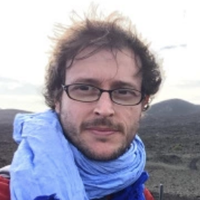
Angelo Pio ROSSI
Scientist, Constructor University of Bremen, Germany
Angelo Pio Rossi is a planetary geologist. He graduated from Università d’Annunzio in Chieti-Pescara in 2000, and since then worked on Mars geology, impact cratering, and terrestrial analogues. After appointments at the European Space Agency (NL) and the International Space Science Institute (CH), he is now based at Constructor University (Bremen). Member of a few mission experiment teams (e.g. ESA MEX HRSC, MARSIS), he co-founded OpenPlanetary, supported various COSPAR Capacity Building workshops, and he coordinates the Virtual Access activity of the Europlanet Research Infrastructure.
Teaching-learning material:
https://aprossi.eu/content/impact-cratering/
Additional information:
https://github.com/europlanet-gmap/impact-cratering
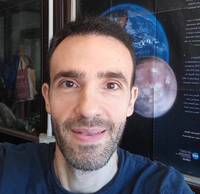
Mauro G. SPAGNUOLO
Scientist, Univeristy of Buenos Aires, Argentina
Dr. Mauro G. Spagnuolo is a planetary geologist. He obtained his PhD. from Universidad de Buenos Aires in 2012, and since then worked on Mars geology and their terrestrial analogues; and did some work on Titan and Moon geology as well. After doing a postdoc in Oregon State Univerisity, he is now based at IDEAN (UBA-CONICET) where he leads the “Laboratorio de Geología Planetaria”. In 2021 he received an award from the National Academy of Exact and Natural Sciences.
https://www.instagram.com/lgp.
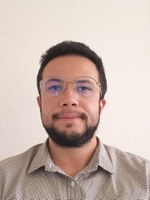
Javier Eduardo SUAREZ VALENCIA
Scientist, Constructor University of Bremen, Germany
Geologist from the Universidad Nacional de Colombia and Ph.D. candidate at Constructor University Bremen, Germany. He has been working for several years in studying planetary surfaces using remote sensing, including Earth, Mars, and Pluto. For his Ph.D. project, he is currently working with geomorphological and hyperspectral data to characterize igneous intrusive activity on the Moon.
https://info.constructor.university/directory/suarez-valecia
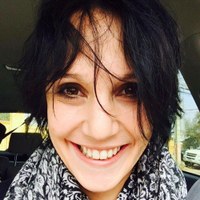
Pamela SUCH
Scientist, National University of Tucuman, Argentina
Experienced geologist with a strong background in innovation and technology. With over 18 years of experience in the mining, oil and gas industry, and academic research. Holds a Ph.D. in Geology, specializing in Ordovician Volcanology and Stratigraphy. As a Planetary Scientist and Research Fellow, Dra. Such focus her research in space resources, asteroids and moons, in CONICET and York University respectively. During her time in York University she innovated in laboratory applied analog research and lab instrumentation for the study of Bennu sample return. After, she join SETI Institute as an affiliated scientist where she worked in the development of new projects and innovative new approaches of space mission data process and analysis. Her experience is highlighted by publications in reputable scientific journals and by her involvement in conferences and workshops worldwide. She is also very committed to knowledge sharing by lecturing and organizing courses for universities and schools and delivering special talks in her areas of expertise.
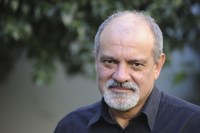
Gonzalo TANCREDI
Professor, Universidad de la República de Uruguay, Uruguay
Bs in Astronomy Universidad de la República (Uruguay) and PhD in Astronomy Upssala University (Sweden). He is professor and Director at the Astronomy Department, Universidad de la República de Uruguay. Gonzalo was the president of the Planetary Systems and Astrobiology Division of the International Union of Astronomy (2018-2021) and president of the researchers association of Uruguay (2021-2023). His research interests are physics and dynamics of small bodies of the Solar System (asteroids, comets, meteors) and the cratering processes related to them. He was a member of the DART mission of NASA and leader of a project to develop a national network of cameras for meteors monitoring. He discovered several asteroids (Montevideo, Vaimaca and Guyunusa). As an acknowledgment, one asteroid was named after him (Tancredi). He is author of numerous research science and outreach articles. He was one of the proponents of the reclassification of Pluto as a "dwarf planet".
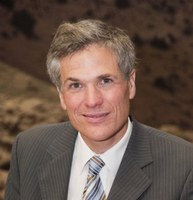
Jorge L. VAGO
ExoMars Project Scientist, ESA-ESTEC
Jorge was born in 1962 in Buenos Aires, Argentina. He obtained a Bachelor of Engineering and Electrical Engineering degrees at the Instituto Tecnológico de Buenos Aires (ITBA). In 1986 he enrolled in Cornell University (Ithaca, NY), where he completed a Master of Engineering in Applied Physics and a Ph.D. in Space Plasmas and Planetary Physics. Since 1992, he is with the European Space Agency in the Netherlands. Initially, he started working on multi-point plasma turbulence analysis in support of the Cluster mission. This was followed by a few years of project management, mainly developing physics experiment laboratories for Russian capsules and the International Space Station. Jorge is ESA’s ExoMars Project Scientist. He is the interface for the investigator communities interested in the ExoMars Programme, particularly on the Rosalind Franklin Mission, tasked with searching for signs of possible martian life. He also helps with other ESA activities in the international Mars exploration context, such as the Mars Sample Return mission. In addition, his work includes representing the ExoMars science objectives at programmatic level and contributing to science mission and payload definition.
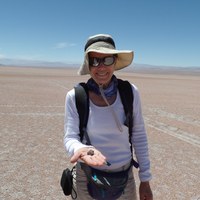
Maria E. VARELA
Scientists, ICATE-CONICET, Argentina
PhD in Geology from the Universidad Nacional del Sur, Bahia Blanca, she performed her post-Doc studies of upper mantle rocks and meteorites at the Laboratorie Pierre Süe (LPS), French Atomic Energy Agency (CEA), Centre D’Etude de Saclay (France). She is a researcher at the Institute of Astronomy, Earth, and Space Science (ICATE-CONICET)-UNSJ, Argentina, leading the cosmochemistry group. She is specialist in petrology and geochemistry of meteorites, with focus on studying the origin and formation of chondrules and glasses (glass inclusions and mesostasis) in chondritic and achondritic meteorites. These studies aim to understand the role of liquids and the fractionation processes in the solar nebula. Since 2017-2020 she served as member of the Council of the Meteoritical Society and from 2021-2022 as member of the Meteoritical Society Nominating Committee.
